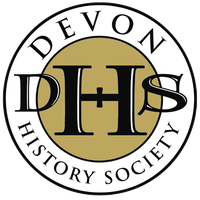Acland, Lady (Emily Anna), Wilmead, Middle Warberry Road, Torquay
The Hon. Emily Anna Acland, née Smith, was born in Paddington on 3 March 1859, the eldest child of William Henry Smith (Viscount Hambledon), the owner of W.H. Smith, newsagents. On 7 July 1887 Emily married William Alison Dyke Acland who rose to the rank of Admiral in the Royal Navy. He became a Deputy Lieutenant of Devon and was appointed Superintendent of Gibraltar 1902–4. After their marriage, the Aclands lived at Rocklands, Chudleigh, before moving to Wilmead, Torquay, in 1909. Lady Acland had two children, William Dyke (b. 16 May 1888) and Hubert Guy Dyke (b. 6 June 1890).
As a young woman Emily wrote three novels. The first, Hugh Moore, was published in 1882, under the pseudonym Evelyn Stone. After her marriage she wrote two more novels under her married name: Love in a Life (1893) and Lost Key (1901). These novels were about life in the diplomatic service.[1]
Lady Acland, supported by her husband, took a keen interest in politics and in the improvement of the condition of working people and children, which she believed could best be achieved by women obtaining the vote, and was on the board of numerous associations aimed at promoting women’s welfare. As a patron of the Devon Nursing Association, Lady Acland frequently addressed the need for more funds for the recruitment and training of nurses and midwives.[2]
In 1906 Lady Acland spoke out against the education bill on religious education, describing it as the “greatest assault on the liberty of conscience and the rights of property that this generation had seen.”[3] Lady Acland was president of the Exeter Branch of the National Union of Women Workers, retiring in 1912 before being elected President of the Torquay branch.[4] In 1914 Acland gave an address to the Torquay NUWSS branch on the Care of Children and the State. In this speech she highlighted the condition of working women and the problems of infant mortality and life chances, particularly amongst the poor and illiterate women. She argued that these were problems best solved by women, and was the key reason why women wanted the vote so that they had more power in solving these problems.[5]
Lady Acland was President of the Torquay branch of the NUWSS.[6] She was also active in the wider movement in Devon. She was a member of the Exeter NUWSS branch, and her husband was one of the platform party at the inaugural meeting.[7] Lady Acland was initially elected President, and later became one of the Vice-Presidents, yielding the position to Sir Robert Newman.[8] She also supported Newton Abbot NUWSS meetings in 1912 and 1913.[9] She donated a Christmas tree to the South West Federation Christmas Fundraising event in November 1913.[10]
When Jessie Montgomery (q.v.) formed the Devon and Exeter branch of the Conservative and Unionist Women’s Franchise Association in 1913, Acland became its first President.[11]
Once war broke out in 1914, Lady Acland threw her support behind the war effort. Both she and her husband spoke on the need for recruitment of men for war. Sir William Acland was on the local Recruitment Committee, encouraging them to get behind the call for volunteers for Kitchener’s Army and stating that the women of Torquay could take on the work of men in shops and driving carts.[12] Lady Acland spoke at a number of meetings of the Mothers’ Union on the ‘Call to Sacrifice’. She was also behind the creation of recreation rooms for wives of soldiers and sailors in Torquay.[13] She came to identify herself as part of the growing Duty and Discipline movement focusing on the organising of relief work for unemployed women and girls.[14]
Lady Acland also continued to support the welfare of working women and was instrumental in stopping a proposed lighting ban in Torquay, claiming that it would be unsafe for women to walk home from work, and described the proposed ban as a cynical indifference on behalf of the authorities to the welfare of women and children; she saw this as an example of why women needed to be represented on the Town Council.[15]
In 1916, as President of the Torquay Branch of the NUWSS she presided over a meeting where Millicent Fawcett gave a speech outlining the productive ability of women and the need for Trades Unions to include women in skilled industries and not to force them into lower skilled work.[16]
At the end of the war Lady Acland supported Mrs Fresham as candidate for Torre in the Borough Council election – deploring the fact that no woman was on the town council and asserting that there was a need for women to be represented.[17] Although selected, Mrs Frensham was not elected.
Admiral Sir William Acland died in 1924. Lady Acland died in Barnes Wood, Welwyn, Herts, on 28 January 1942.[18]
Entry created by Rachel Jasinska, September 2018
[1] https://www.victorianresearch.org/atcl/show_author.php?aid=2262
[2] Devon and Exeter Gazette, 18 Mar 1905.
[3] North Devon Journal, 14 Jun 1906.
[4] Western Times, 29 Nov 1913.
[5] Western Times, 23 Jan 1914.
[6] Western Times, 23 Jan 1914.
[7] Devon and Exeter Gazette, 13 Feb 1909.
[8] Devon and Exeter Gazette, 23 Feb 1909; 20 Apr 1909.
[9] Devon and Exeter Gazette, 31 Oct 1912; 22 Nov 1913.
[10] Western Times, 29 Nov 1913.
[11] Devon and Exeter Gazette, 25 Sep 1913, letter from E.A. Acland inviting women to join.
[12] Western Times, 3 Aug 1914.
[13] Devon and Exeter Gazette, 18 Jan 1915.
[14] Western Times, 19 Jan 1915.
[15] Western Times, 2 Dec 1915.
[16] Western Times, 13 Oct 1916.
[17] Western Times, 23 Nov 1918.
[18] Family and census records, www.ancestry.co.uk .
